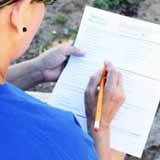Reduce Food Packaging

Switching from EPS Foam containers and plastic utensils to reusable trays, cups, plates, and utensils can make a big difference.

Building a Clean Water Future means we need to work with others to find ways to keep our water clean, healthy and beautiful. Trash is everywhere in our busy lives and we can easily drop something or not even notice when a food wrapper or plastic bottle gets away from us. The frequent rain on the Gulf coast washes trash into our storm drains where it then flows into our streams, into the bay and into the Gulf. Fish and marine animals can mistake plastic trash for food or get tangled in it. Pet waste runoff can make water unsafe for swimming, fishing or boating.
Some people dump trash in out-of-the-way places but that trash then gets washed into our waterways. Join a coastal cleanup or start a recycle program or just make sure you always place your trash in secure receptacles. Even small things like bottle caps can injure or kill marine creatures. We are fortunate that we have organized city services that collect trash and waste. Let's use these services so we can build a Clean Water Future.
While it's difficult to say exactly how much plastic is in the ocean, scientists think about 8 million metric tons of plastic trash are in our oceans. This plastic pollution makes our waters unsafe and unsightly (NOAA. 2017)
Plastic Recovered from Dauphin Island Beach by Caitlin Wesse
Over the 35 history of the International Coastal Cleanup, volunteers have removed over 344,521,233 Pounds of litter from beaches and waterways around the world. The top-ten list of items removed includes items like plastics bottles, plastic bottle caps, aluminum cans, cigarette butts, derelict fishing gear and a range of disposable plastic goods and food packaging. (Ocean Conservancy, 2021)

Litter does not belong on the ground where it can be washed down into storm drains and flow into our streams and bays. Hold on to the trash until you find a trash can to put the trash in.
Bottle caps, candy bar wrappers, chip bags, and cigarette butts all can cause major problems for fish, birds, and marine mammals downstream. So make sure they end up in the trash can.
Image by J.smith - CC BY-SA 3.0

As you're out and about or at school, reuse a grocery bag by carrying it around in your backpack or purse so you have somewhere to secure wrappers, bottles and other trash that you can throw out when you get home.
Attending a litter cleanup is a fun way of undoing the damage of years of people not making sure their trash ends up in the trash can or recycled. Find a cleanup close to you.

At the turn of the century, New York City's street sweepers were called White Wings because of the fancy white uniforms they wore, complete with coats and ties and matching pith helmets.

How big is the marine debris problem, and how is it changing over time? Which debris types are most common? Interested in getting involved?

Switching from EPS Foam containers and plastic utensils to reusable trays, cups, plates, and utensils can make a big difference.

Each plastic bottle will outlive you for centuries. When you can't avoid them, find a way to recycle them!
Getting out on the water is not only fun and great exercise, the more you use the water, the more likely it is you'll think about protecting it. So go ahead, go for a swim, get your fishing pole, take a boat for a ride, or attend a water festival near you.

When water rushes off hardened surfaces, erosion of sediments degrade water conditions and smother and disrupt seagrass growth and the habitat for benthic organisms they provide.

Compounds like oil, grease, and heavy metals take a long time to break down and threaten the health of both aquatic and human life.

Litter is not only unsightly, but it also causes a variety of problems to the ecosystem as it enters our waters where it is often is mistaken for food by fish and invertebrates.

Too much fertilizer, pet waste, and other nutrients in our water often lead to serious problems like lowering dissolved oxygen levels, preventing seagrass growth, and killing fish.

Disease-causing microorganisms, including bacteria, viruses, and other single-celled organisms, are referred to as pathogens, some, like Salmonella, cause human health problems.

While pesticides are designed to be toxic to certain organisms, they can often be harmful and kill other species in the marine system that are important for the entire ecosystem.